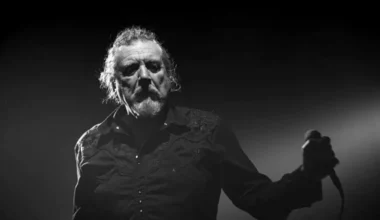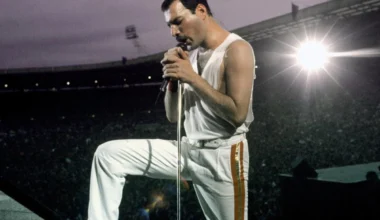Hetfield’s troubled childhood would become the backdrop for the three-part rock ballads known as ‘The Unforgiven’ parts I, II and III. A trilogy of a single song, spanning two decades. The trilogy brings the band members together to portray a person’s journey from youth to old age, from personal struggles to the limitations of society. Each song in the trilogy has a different subject, different style, and a different lyrical content. Each song is about different confrontations which is ultimately about identifying different sources of suffering and taking different approaches to their consequences.
Perhaps in each song the confrontation has reached a point where it can be brought to a conclusion, but the main emotions from which the song draws its power are quite different.
Part I: ‘New Blood Joins This Earth’
The first part of the trilogy deals with James Hetfield’s childhood experiences, his family’s choices, the first social impressions a child encounters, and how they affect a young man. Hetfield explained to Maximum Guitar in 1998 that:
“The Unforgiven’ was basically about alienation and, kind of, regret in life”
A father who abandoned his family and a mother who refused to accept treatment for her cancer because of her devout Christian beliefs only to pass away when her children were teenagers. James certainly had a painful childhood. But the loneliness of an adolescent boy is also embedded throughout these horrific events. In an interview with the New Yorker in 2022, James recalled being embarrassed when he wasn’t allowed to attend health class, or receive a physical to play football. He said:
“When my dad was up there reading from the Scriptures, he was getting tears in his eyes. It moved him. I didn’t get it. I thought something was wrong with me. It felt lonely.”
In ‘The Unforgiven’, this is what James describes as giving in as a result of alienation.
“New blood joins this Earth, and quickly he’s subdued
Through constant pained disgrace, the young boy learns their rules
With time the child draws in, this whipping boy done wrong
Deprived of all his thoughts, the young man struggles on and on, he’s known”
In the chorus, ‘What I’ve felt , What I’ve known, Never shined through in what I’ve shown’, he talks about the social scars left on him as a result of not being able to live his childhood, which is perhaps the most pivotal period in personality development. He thinks that he’ll never see what kind of person he would have been since society has taken away his unique personality, feelings, and thoughts. James ends the chorus by declaring everyone ‘The Unforgiven.’
Ever since the ‘New blood joined this earth’, he is not allowed to be expressive or creative; he is ‘never free’: Society always labels people based on factors such as religion, race, sexual orientation, etc. So James returns the favor by labeling the main suppressors of society back. At the end of the song, he expresses the anger and regret he feels one last time with the following lines:
“You labeled me, I’ll label you
So I dub thee unforgiven”
James, who hid his feelings behind closed doors and had trust issues after these traumas, would sing about those doors in the second part of the trilogy.
Part II: ‘The Door Cracks Open’
Structurally, ‘The Unforgiven II’ shares many traits with its predecessor. The same held note opens both tracks, the chord structures are noticeably similar and even some lyrics – such as ‘What I’ve felt, what I’ve known’ are repeated. However, the content and theme of the song are quite different. The song is a confrontation with that special person, resulting from the difficulty of letting someone into James’s life. Where ‘The Unforgiven’ was sung as a narrative, ‘The Unforgiven II’ is a first-person account. In the lyrics, Hetfield sings to a female counterpart as he asks her what ‘they‘ have done to her, while also asking her to ‘speak the words‘ he wants to hear to dispel his troubles.
“Lay beside me and tell me what they’ve done
And speak the words I wanna hear, to make my demons run
The door is locked now, but it’s open if you’re true
If you can understand the me, then I can understand the you”
Hetfield calls for ‘understanding’ between the male and female characters and talks about connecting with each other, in a way, about letting someone in.
The chorus of ‘Unforgiven II’ continues with Hetfield asking the female character if she is also ‘Unforgiven’, reinforcing the chorus of the previous song:
“What I’ve felt, what I’ve known
Turn the pages, turn the stone
Behind the door, should I open it for you? Yeah
What I’ve felt, what I’ve known
Sick and tired, I stand alone
Could you be there? ‘Cause I’m the one who waits for you
Or are you unforgiven too?”
James thinks that his partner should be someone who understands the darkness he feels.
However, in the later parts of the song, while he hopes to benefit from this partnership, he falters for a moment, thinking that this is unrealistic. He sings:
“She loves me not, she loves me still, but she’ll never love again
She lay beside me, but she’ll be there when I’m gone
Black heart scarring darker still, yes she’ll be there when I’m gone”
Because if she really is like James, then she can’t cure him.
“the door is closed, so are your eyes
but now i see the sun, now i see the sun
yes, now i see it”
The door has opened and then closed again, the bonding session is over, but now the darkness is gone and it’s bright. This is the moment when James realises that he can build a strong bond. While at first he was afraid that his partner was also ‘Unforgiven’, now he establishes this bond precisely because she is ‘Unforgiven’ too. With the happiness of this, he says that the key to the door will always be in that person:
“I take this key (Never free), and I bury it (Never me) in you
Because you’re unforgiven too”
When he sings these lines at the very end of the song, James makes a reference to his lyrics of the first song with ‘Never free, never me’ Is this just a cool reference to the first song or is there someone else who is ‘Unforgiven’ as well?
Part III: ‘It’s Me I Can’t Forgive’
The Unforgiven III is a bit different in structure than the other two songs. The intro is different than what we have heard in the previous songs. Various instruments like the piano, violin, and trombone can be heard from this intro. The theme is similar but not really.
‘Unforgiven III’ reflects James’ journey as he seeks the world for purpose, and success, and the pursuit of goals metaphorically represented in the song by sailing the seas in search of gold. The opening lyrics of the song refer to James never knowing that this path of fame and wealth would change his life. He was going on the right path, but wealth led him away from his destination. James is questioning his ambitions and his life decisions:
“How could he know this new dawn’s light
Would change his life forever?
Set sail to sea but pulled off course
By the light of golden treasure
Was he the one causing pain
With his careless dreaming?
Been afraid, always afraid
Of the things he’s feeling
He could just be gone
He would just sail on”
But in his search for the gold, he caused himself and possibly others pain and loneliness. He is no longer wanted anywhere and he has tried to get somewhere but has failed. So technically he can’t be lost if he has nowhere to be found or no place where people want him. Therefore, in the chorus of the song below, he states that he cannot forgive himself:
“How can I be lost
If I’ve got nowhere to go?
Searched for seas of gold
How come it’s got so cold?
How can I be lost?
In remembrance I relive
And how can I blame you
When it’s me I can’t forgive?”
In the second verse we are confronted with more introspective lyrics. James is now in a deep depression. Existentially defeated. The water represents the progress of life and the ship represents his soul. The ship is incompatible with shallow water, so it sinks. He’s defeated and alone:
“These days drift on inside a fog
It’s thick and suffocating
This seeking life outside its hell
Inside intoxicating
He’s run aground, like his life
Water much too shallow
Slipping fast, down with the ship
Fading in the shadows
Now a castaway
They’ve all gone away”
There was only one way out: To forgive yourself. To accept that you could never be prepared with what went wrong with your life. To be at ease with what you have done with your life. In the bridge, James asks for forgiveness over and over again. He screams and asks how he can forgive himself ?
That’s the problem. He doesn’t know how to realize his only redemption because he’s never forgiven anyone including himself. The story doesn’t have a happy ending. Now James Hetfield is ‘Unforgiven.’







